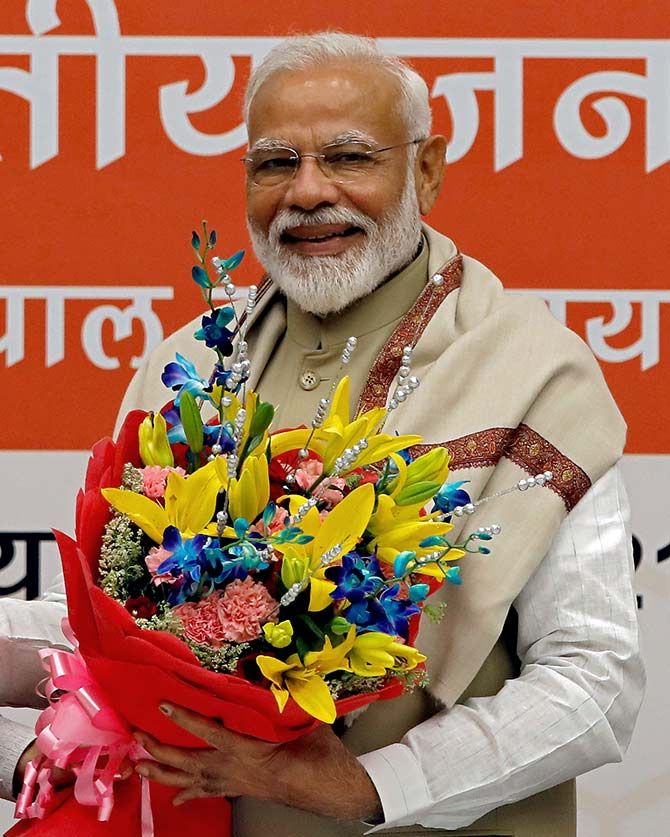 | « Back to article | Print this article |
'As long as a Hindu rashtra is not formalised, one can live in hope,' says Amulya Ganguli.

Five years ago, he won the general election by promising jobs.
Now, he has won another election by pledging to kill Pakistani terrorists by entering their houses -- ghus ghus ke maroonga.
Little wonder that ordinary Pakistanis are uneasy about his success, as reports from across the border say.
It is a fear which will further enhance Modi's standing in the eyes of his followers in India, who now comprise 41% of those who voted.
If his belligerence has helped him, the reason is that aggressive nationalism is always appreciated in peacetime.
It is only when war breaks out and bombs fall from the skies, killing ordinary people, that militant nationalism becomes counter-productive, as Europe discovered in the last century.
Until that happens, the combative leader is invariably applauded.
Since India faces an unreconciled adversary in Pakistan, Modi's brand of nationalism will always have many takers.
Aware of this mindset of hoi polloi, he and his party never fail to remind their listeners of the pusillanimity of the previous government, which failed to respond with surgical strikes against the attack on Mumbai by Pakistani 'commandos' in November 2008.
But it will be wrong to credit only the surgical strikes carried out by Modiji ke sena -- to quote UP Chief Minister Ajay Mohan Bisht -- for the BJP's latest success.
What also helped him is the fact that his opponents were at sixes and sevens, unable to get their act together to take on the Modi-Amit Shah duo despite the promise of forming gathbandhans -- maha or otherwise.
The party which was most culpable in this respect was the Congress, which could not utilise its electoral victories in Rajasthan, Madhya Pradesh and Chhattisgarh last year to consolidate its position as a challenger to be feared.
Instead, the Congress continued to do what it does best -- indulging in factional back-stabbing - which led to the sidelining of Sachin Pilot in Rajasthan and of Jyotiraditya Scindia in Madhya Pradesh.
There was no attempt on the Congress's part to build on the basis of its successes in the three states by reaching out to allies like the Bahujan Samaj Party and the Samajwadi Party.
The result was the Congress's ignominious defeat in these states at the hands of Modi, who has more than adequately avenged the BJP's last year's losses.
But why blame the Congress, for Modi, according to former Madhya Pradesh chief minister Shivraj Singh Chauhan, is 'blessed with God-like powers'.
It is perhaps these powers which have enabled him to convince the people that 'achhey din' is a continuous process.
Even is there are no jobs at present, Modi still deserves support, for only he can ensure that there will be jobs in the future.
In the BJP's view, that is an achievement which is beyond the Congress's capability as it is a house at war with itself.
The BJP, on the other hand, runs a harmonious household with even the previously restive Shiv Sena having been tamed.
It is obvious, therefore, that the man with 'God-like powers', who was also earlier hailed as God's gift to the nation by Vice-President Venkaiah Naidu, will preside over India's destiny for at least the next five years.
It is a tryst which may see more yogis and sadhvis enter the legislative chambers to serve the nation.
So far the emphasis has been on asserting India's Hindu identity via various rituals, including meditation in a Himalayan cave.
As long as a Hindu rashtra is not formalised, one can live in hope.
Amulya Ganguli is a writer on current affairs.
